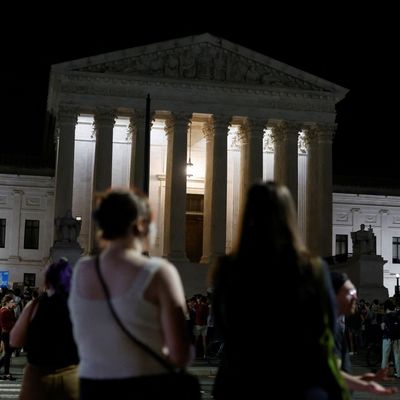
Most Americans do not want to ban abortion. About 60 percent believe the procedure should be legal in all or most cases, the Pew Research Center reported last year. Should the Supreme Court indeed overturn Roe v. Wade, as a leaked draft of the majority opinion in Dobbs v. Jackson Women’s Health Organization suggests, there is every reason to believe the decision will be unpopular. Yet public opinion matters little to the right wing and conservatives are organizing behind a national abortion ban, according to the Washington Post. “This is a whole new ballgame,” Kristan Hawkins, the president of Students for Life Action, told the newspaper. “The 50 years of standing at the Supreme Court’s door waiting for something to happen is over.”
There will soon be no reason for them to linger outside the Court in hope. The right’s long war to ban abortion in the United States may be nearing its conclusion. The draft opinion authored by Justice Samuel Alito, argues that “a right to abortion is not deeply rooted in the Nation’s history and traditions.” Women should not fear, he asserts later, because they “are not without electoral or political power.” This is thin comfort. Pro-choice women can influence their fates through direct action: by breaking unjust laws, or by filling streets in the defense of their bodies. Electorally, however, their powers are limited by the influence of an anti-democratic conservative movement.
What is happening inside the Supreme Court is not the triumph of the American people but rather the success of a well-funded minoritarian faction. The battle for abortion pits the electoral and political power of a pro-choice majority against that of conservative elites, and it is easy to see who is winning. (Conservatives have focused their attention and ire on the leaked opinion because they view it as a crime committed against them. The court is theirs; anyone who violates its sanctity is an enemy. The possibility that the leaker might be a conservative does not change this basic calculus.) Anti-abortion activists have discovered that with enough elite power at their disposal, they can comfortably ignore the wishes of the people. Their stance on abortion predisposes them to a tyrannical form of politics. If abortion kills a human being, then public opinion does not matter; in fact, to defer to the public is to become complicit in mass murder.
When the justices formally rule on Dobbs, and surely strike down Roe, they will continue a anti-democratic tradition that includes Bush v. Gore, which overruled the popular vote and put George W. Bush in office; Korematsu v. United States, which upheld the internment of Japanese Americans during World War II; Plessy v. Ferguson, which upheld segregation; Dred Scott v. Sandford, which found that the descendants of slaves could not be American citizens: and Buck v. Bell, which permitted the forcible sterilization of the “feeble-minded.” The core of Dobbs will be misogyny, just as racial prejudice shaped Korematsu, Plessy and Dred Scott, and as ableism and classism shaped Buck. The eventual Dobbs decision could usher in a new crisis of legitimacy in American politics, which necessarily damages faith in the Supreme Court. This may also be the only positive outcome of Dobbs.
While Supreme Court verdicts such as Roe, Brown v. Board of Education, and Obergefell v. Hodges were laudable, they are not enough to rescue the court from illegitimacy. The court’s partisan nature, its size, its lifetime appointments and its ties to the most rarefied American institutions prevent it from safeguarding the rights of the American people. Schoolchildren learn that the Court is a vital element of our democracy, but outside the classroom reality is less forgiving. With each passing year, the high court looks more like a relic of a more unfortunate age.
It is not enough to urge voters to turn out in November, as prominent Democrats including President Joe Biden have suggested. The suggestion is an insult. Pro-choice wmen have voted, and run for office, and done all the party has asked them to do. Now is the time for action, such as promising to expand the size of the court and pack it with like-minded jurists. The likely ruling in Dobbs should also make liberals consider reducing opportunities for judicial review, which limits the power of the vote by making its legislative outcomes subject to the opinions of an unelected Court majority.
Although these solutions may appear radical, their expansive qualities are part of their appeal. To break conservative tyranny, break its tools. Start with the Supreme Court.
More on Life After Roe
- ERA Ratification Is Now Up to Trump’s Supreme Court
- The Unlikely Reason RFK Jr. Could Be Rejected by the Senate
- Project 2025’s Mastermind Is Obsessed With Contraception






























